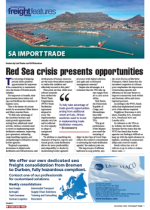South African importers have to overcome a number of non-tariff trade barriers (NTBs) to keep goods moving.According to the International Trade Administration Commission, they include port congestion, technical standards, customs valuation above invoice prices, theft of goods, import permits, anti-dumping measures, foreign worker visa permitting, violations of intellectual property rights, an inefficient bureaucracy, excessive regulation, and requirements to localise supply chains.While physical trade infrastructure such as ports and rail occupy much of the attention of policymakers and bureaucrats, Chris Hattingh, executive director at the Centre for Risk Analysis, says in African Liberty, a platform for advancing individual freedom, peace, and prosperity in Africa, that NTBs are as important.They include onerous licensing requirements, long processing delays, inefficient customs procedures, subsidies, and technical barriers. He cites an August 2024 World Bank study, “Unlocking South Africa’s Potential: Leveraging Trade for Inclusive Growth and Resilience,” which lists a number of actions that need to be taken to reduce the cost of doing business with South Africa.The report acknowledges that the government has made some progress in addressing non-tariff barriers, but says additional reforms are needed.“Notably, investment in ports, road and freight infrastructure is needed, which will require bringing in private-sector investment. “Beyond continued efforts by the South Africa Revenue Service to streamline processes and procedures to assist exporters and importers, developing a National Single Window for trade-related processes would also facilitate a reduction in red-tape costs for exporters and importers. “In the short term, strengthening trade facilitation, notably by revisiting the mandate and composition of the National Committee on Trade Facilitation, would help address persistent bottlenecks and non-tariff barriers,” it adds.According to Hattingh, there are far-reaching negative effects from tariff barriers and subsidies put in place to protect local industry.“The country’s overall economic development and competitiveness suffer, as state intervention leads to industry consolidation and raises barriers to new entrants. As a result, the number of companies receiving state benefits continues to dw indle.”The World Bank study says partners in the Southern African Customs Union (Sacu) are affected by higher South African import costs.“SA’s trade and industrial policy also does not occur in a vacuum and would result in large income losses for countries where SA is a significant trade partner.” Sacu member states could see income losses ranging from 1.5% to 2% of national income, it estimates. Importers could make use of a new app developed by Tanzanian entrepreneur Nicholaus Noah, which can report non-tariff barriers to the secretariat of the African Continental Free Trade Area. ER

